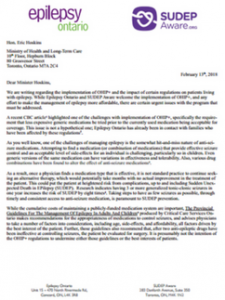Hon. Eric Hoskins
Ministry of Health and Long-Term Care
10th Floor, Hepburn Block
80 Grosvenor Street
Toronto, Ontario M7A 2C4
February 13th, 2018
Dear Minister Hoskins,
We are writing regarding the implementation of OHIP+ and the impact of certain regulations on patients living with epilepsy. While Epilepsy Ontario and SUDEP Aware welcome the implementation of OHIP+, and any effort to make the management of epilepsy more affordable, there are certain urgent issues with the program that must be addressed.
A recent CBC article1 highlighted one of the challenges with implementation of OHIP+, specifically the requirement that less expensive generic medications be tried prior to the currently used medication being acceptable for coverage. This issue is not a hypothetical one; Epilepsy Ontario has already been in contact with families who have been affected by these regulations2.
As you well know, one of the challenges of managing epilepsy is the somewhat hit-and-miss nature of anti-seizure medications. Attempting to find a medication (or combination of medications) that provide effective seizure control and an acceptable level of side-effects for an individual is challenging, particularly so in children. Even generic versions of the same medication can have variations in effectiveness and tolerability. Also, various drug combinations have been found to alter the effect of anti-seizure medications3.
As a result, once a physician finds a medication type that is effective, it is not standard practice to continue seeking an alternative therapy, which would potentially take months with no actual improvement in the treatment of the patient. This could put the patient at heightened risk from complications, up to and including Sudden Unexpected Death in EPilepsy (SUDEP). Research indicates having 3 or more generalized tonic-clonic seizures in one year increases the risk of SUDEP by eight times4. Taking steps to have as few seizures as possible, through timely and consistent access to anti-seizure medication, is paramount to SUDEP prevention.
While the cumulative costs of maintaining a publicly-funded medication system are important, The Provincial Guidelines For The Management Of Epilepsy In Adults And Children5 produced by Critical Care Services Ontario makes recommendations for the appropriateness of medications to control seizures, and advises physicians to take a number of factors into consideration, including age, side-effects, and affordability, all factors driven by the best interest of the patient. Further, those guidelines also recommend that, after two anti-epileptic drugs have been ineffective at controlling seizures, the patient be evaluated for surgery. It is presumably not the intention of the OHIP+ regulations to undermine either those guidelines or the best interests of patients.
It is the recommendation of Epilepsy Ontario and SUDEP Aware that:
1) A grandfather policy be adopted for all people with epilepsy on anti-seizure medication prior to 1 Jan – to allow them ongoing access to their medication regardless of whether their medication falls within the Ontario Drug Benefit program or not.
2) No prescription for anti-seizure medications be refused coverage simply because a less expensive anti- epileptic drug is available but has not been previously tried. This allows prescribers to immediately provide the most effective drug to new patients based on their clinical experience. It also eliminates potential risks involved in transitioning patients from one drug to another. Lastly, it prevents the wasting of resources and medications during mock ‘trials’ (a practice that has already been drawn to our attention).
3) The Ministry of Health provide guidance to prescribers about how to discern the most affordable prescription option without sacrificing effectiveness or forcing patients to endure an unnecessarily long trial period.
As with any new system of care, there is bound to be a transition period where these types of issues are identified and addressed. However, as changes to, or withdrawal from, anti-epileptic drugs can have an immediate and severe impact, we request that the Ministry of Health take immediate steps to deal with this issue.
Sincerely,
Drew Woodley Tamzin Jeffs
Director, Government Relations Executive Director + Co-founder
Epilepsy Ontario SUDEP Aware
CC Jeff Yurek, MPP
France Gélinas, MPP
Paul Raymond, Executive Director, Epilepsy Ontario

1 http://www.cbc.ca/news/opinion/ohip-plus-1.4528800
2 https://epilepsyontario.org/toronto-couple-concerned-after-learning-ohip-will-not-cover-daughters-anti-seizure-medication/
3 http://onlinelibrary.wiley.com/doi/10.1111/epi.14010/abstract
4 http://onlinelibrary.wiley.com/doi/10.1111/j.1528-1167.2010.02952.x/full
5 https://www.criticalcareontario.ca/EN/Epilepsy%20Guideline%20Series/Provincial%20Guidelines%20for%20Management%20of%20Epilepsy%20in%20Adults%20and%20Children_January%202015.pdf





